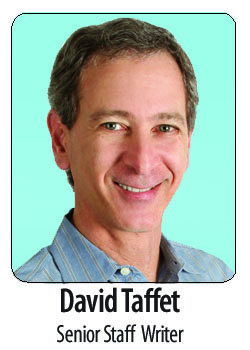Churches that insist on in-person services are putting their congregations and their communities at risk
 This week is Pesach — known in English as Passover — most Jewish people’s favorite holiday. We celebrate with the Seder.
This week is Pesach — known in English as Passover — most Jewish people’s favorite holiday. We celebrate with the Seder.
But what does Jewish law tell us about conducting a Seder in a world of physical distancing?
We look to the commandments around Yom Kippur, the holiest day of the year in Judaism, for the answer. On that day, we fast from sunset to sunset — no food, nothing to drink.
But the commandment to fast on this holiest of days is superseded by the commandment to not endanger your life. If you’re on a prescription that must be taken with food, you eat. If you have a pill you must take with water, you drink. If you’re recovering from, say kidney stones, and need to drink plenty of fluid, YOU DO IT.
In other words you never do anything to endanger your life or well being.
So on Passover, if we must physically distance to remain safe, that’s what we are commanded to do.
We celebrate Passover with a big dinner at which we tell the story of the Exodus. We’re commanded to eat matzo (unleavened bread) to remember how God threw boxes of Manischewitz at the Israelites as they wandered through the desert. We remember how God convinced Pharoah to let His people go by letting loose with 10 plagues — you know: locusts, tornadoes, coronavirus, death of people with pre-existing conditions, etc.
This really isn’t a year we should skip Passover observances.
So I usually get my matzo from Central Market, even though their parent company is HEB, which seems to be some sort of slur. But as God’s revenge for that HEB slur, the Central Market I go to at Preston Royal was destroyed by the tornado last October.
So I tried Whole Foods. They had matzo, but if they didn’t, I was going to get creative. After all, isn’t our creativity how we’re all getting through this pandemic?
Matzo is made of flour and water. No yeast. No eggs. No additional ingredients. I was going to roll it out flat on a cookie sheet and bake. How long? I don’t know. Awhile?
But then there was the whole issue of getting together for the Seder.
Doctors in my synagogue, Congregation Beth El Binah, were already sounding the warning bells about this virus almost two months ago. We cancelled our Purim party. And we began conducting Shabbat services via Zoom.
Zoom’s been fun. Everyone chats. Our terrible singing — most of our service is sung or chanted — just became worse online. Normal for us is singing out of key, in various keys and even more than one melody at once. Add to that the two-second Zoom delay we get depending upon each person’s band-width or speed. It’s not quite enough delay for us to be singing in rounds, but enough to make our bad singing worse.
But what is important is that we are together online while we are also safe at home.
And this fulfills the greatest mitzvah (commandment) in Judaism — to protect our lives.
Congregation Beth El Binah normally meets at Northaven United Methodist Church, so I know we’re not alone in the religious world in choosing to put life above a building. All the other Methodist churches in the Dallas diocese are closed as well. (Shout out to our friends at Northaven. We love you. We miss you. Stay safe).
While not being able to meet in person hurts, sickness and death hurt more. And churches that are opening and inviting in crowds are endangering their own well being, the wellbeing of their congregations and the wellbeing of everyone with whom someone in their congregation comes in contact.
Short-term gratification is overtaking long-term health and safety.
But far be it from Gov. Greg Abbott to lead in this area. In fact, he cited the First Amendment to the U.S. Constitution to prevent local stay at home orders from applying to houses of worship — not even a plea for them to stay safe.
Because testing is still restricted to those showing symptoms, we don’t know how many people are carrying the virus. Latest evidence shows asymptomatic people spread it. A packed church not practicing physical distancing is a perfect place to pass around the coronavirus.
While I get that we don’t want to interfere in how anyone practices their religion, I don’t want to see more people die.
As someone who lived through the AIDS epidemic, I have something to say, and I beg you all to please listen, especially the straight, right-wing, religious people who were so horrible to us during those two decades of devastation. To those pastors who back then preached “all the right people are getting it,” let me just say there are no “right people” to fall sick and die. Not of AIDS. Not of coronavirus.
To those who hoped for my death during the AIDS devastation, I pray for your life and safety.
Because of AIDS research, we learned so much more about the immune system than we previously knew. Before HIV, we had no drugs to treat viruses. Now there are hundreds. One of them, or a variation of one, of them may work on the coronavirus.
And we may know soon.
Vaccines are also being tested. We may have one approved within 18 months. Until then, hold tight, physically distance and remain socially connected. Be safe.
David Taffet is the senior staff writer for Dallas Voice and a member of Congregation Beth El Binah. Cooking is not his strong point, so we are all glad he did not have to try and make his own matzo.
















A,wonderful issue. Thank you David Taffet